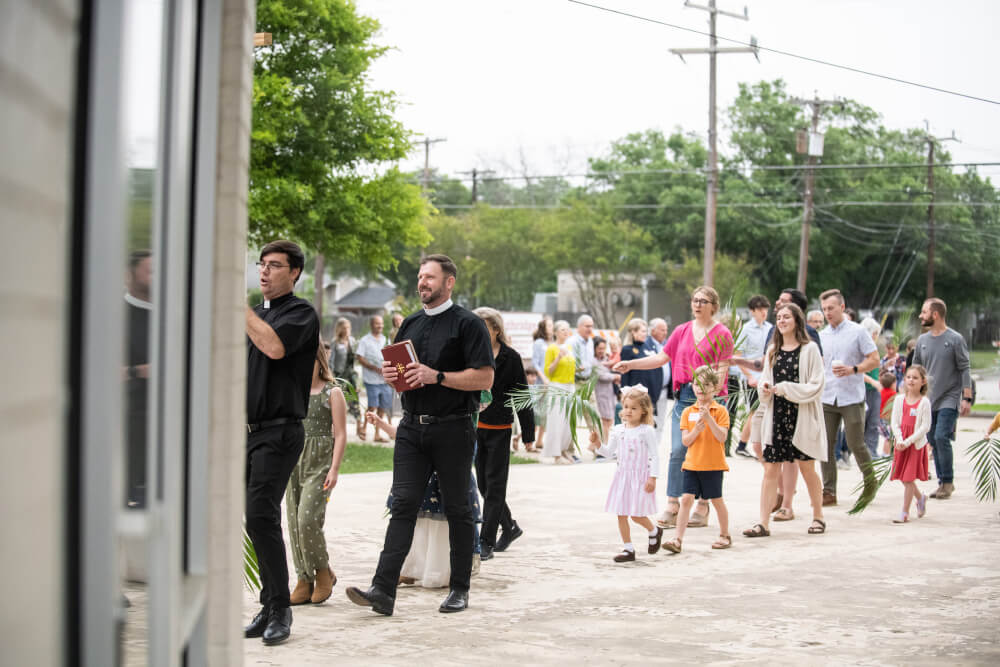
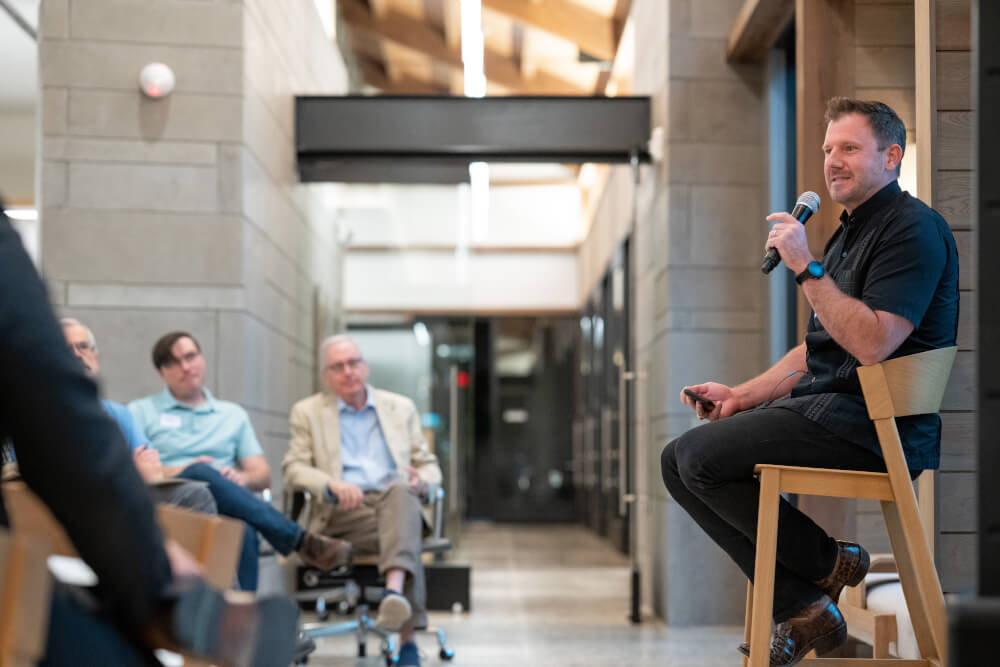
BUILDING FRIENDSHIPS ACROSS COMMUNITY DIVIDES LEADS TO ECONOMIC MOBILITY AND A MORE COMPASSIONATE CITY.
GRACE NORTHRIDGE PASTOR BRIT CARPENTER HAS EXPERIENCED IT FIRST-HAND.
The first time I called Pastor Brit Carpenter in the summer of 2021, I knew he lived and pastored in one of San Antonio’s upper-class neighborhoods, but that was about it.
“Honestly, when you called me, I was sitting right there,” he said as he pointed to his desk chair, “and I had no idea what was going to happen.”
I called Brit because he is the pastor of Grace Northridge Church in the heart of Alamo Heights, a city where the median household income is roughly 176% higher than the rest of San Antonio. This reality was important as I was assembling a Narrative Change Cohort, part of a program designed to help San Antonians rethink and recast the stories we hold about one of the most profound challenges we face as a city: deep poverty and economic segregation.
Brit was in our database because he had attended Laity Lodge Family Camp. His wife had also worked at LLYC. “I only said ‘yes’ to [your cohort],” he told me, “because I knew the Foundation did things with excellence and thought, ‘What’s the worst that could happen?’”
That fall, the cohort launched over a couple days at Laity Lodge. Britt and most of the eleven other pastors who joined—representing ten different ZIP codes and nine denominations—had never met before arriving for the retreat, so that first morning we shared our origin stories.
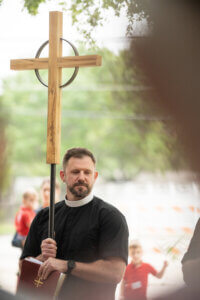
Brit grew up in two homes in Houston. He lived in both his dad’s trailer park and an apartment with his mom, which was adjacent to a middle- to upper- middle-class neighborhood. Brit says he was always one of the poor kids.
“I didn’t know any different,” Brit told me. “It was just life. I grew up with a knowledge that I was never fully a part of the group.”
Most of Brit’s friends from both the trailer park and apartment complex grew up in single-parent homes. Often these parents worked two to three jobs at a time, and many of them struggled with addiction. Although Brit’s parents were divorced, they were both involved in his life, and he knew enough to be grateful for that. As a schoolteacher, his mother pushed him to reach his potential and go to college.
“I don’t know if it was conscious, but I was setting up my life so that I could get out of that lifestyle and so that I never had to live in it ever again,” Brit said. He watched his friends fall into the same problems their parents had—drugs, alcohol, and evictions—and was determined to walk a different path.
After high school, Brit worked several jobs to get himself through Texas A&M University and afterwards pursued a career as a minister. He took a position straight out of college at a megachurch near Houston. He says this “was a good first step to not living how I had grown up.”
Brit was finally in a place of financial stability. But as he reflected with us at Laity Lodge, he shared that it had taken more than just his own merit and hard work.
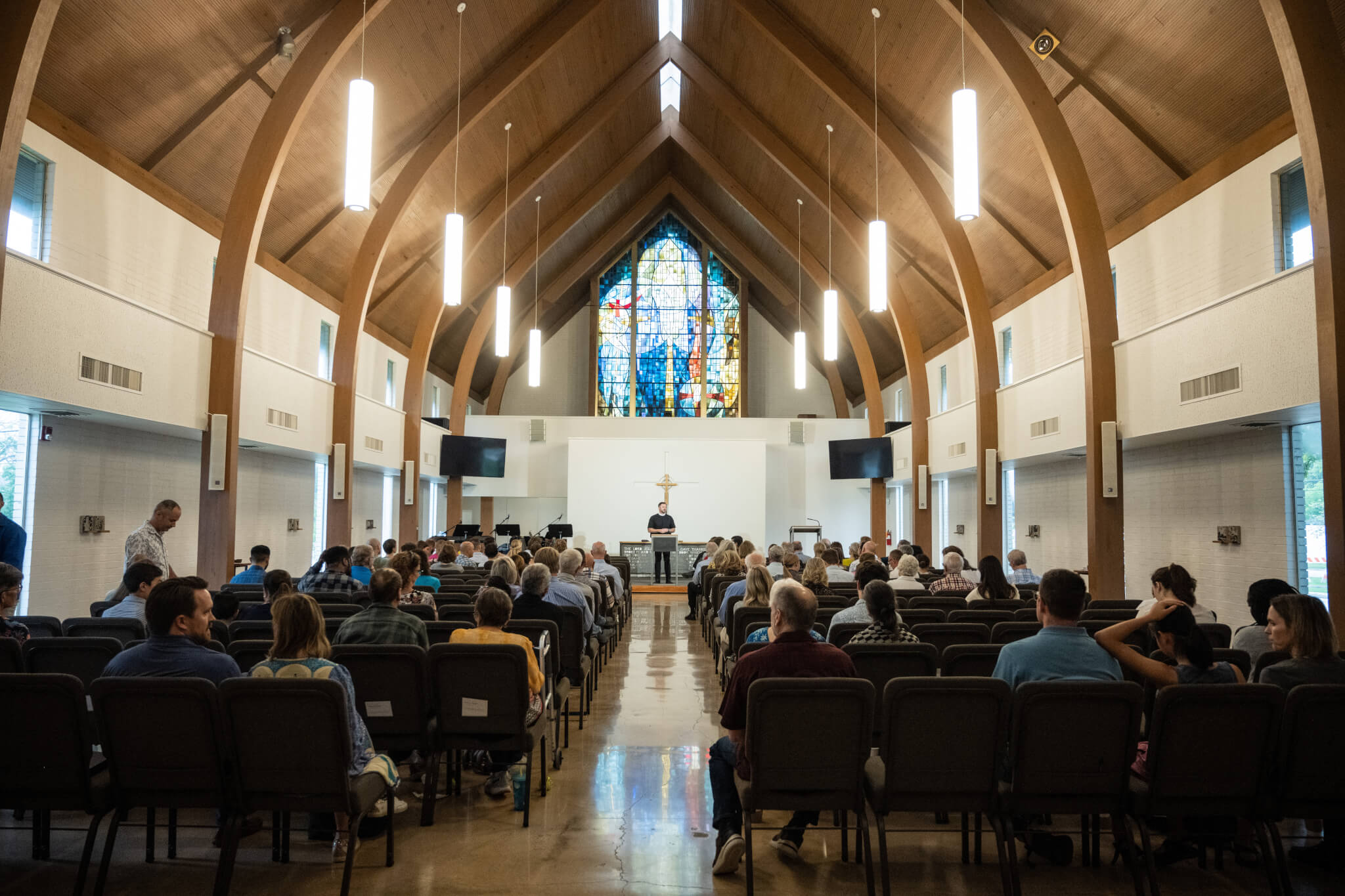
He no longer feared falling into the same paths he had witnessed as a kid. He had an education. He had a good job. But after leaving the trailer park and meeting a new set of friends in college, he also had people who inspired him and upon whom he could depend. And that, he says, was the key to getting out of poverty and staying out.
“Friendship is core to who I am,” Brit said. “But also, I learned that to get out of poverty, it comes down to who you know. And if you have a strong network, you’ll get ahead.”
Recent studies prove Brit’s point. According to a 2022 study by Raj Chetty, a professor of economics at Harvard University and the director of the Opportunity Insights research lab, the key to economic mobility is simple: friends. Chetty argues that economic connectedness—friendship across class—is one of the drivers of economic mobility.
“I have contacts I can call for any rainy day that could come up,” Brit said. “Nobody I grew up with has that. They have no safety net.”
“I have contact I can call for any rainy day that could come up. Nobody I grew up with has that. They have no safety net.”
He painted a picture of the economic isolation that cycles of poverty create. Those realities are often exacerbated by things like a neighborhood’s inability to meet basic family needs like affordable childcare, income increases not matching inflation rates and forcing folks to work multiple jobs at a time, or our country’s history of unjust lending practices that concentrate poverty into certain neighborhoods.
While Brit had spent his entire adult life avoiding the circumstances of his childhood, through the Narrative Change Cohort he reconnected with those realities in a way that prompted him to reflect on the cost of staying distant from economically disadvantaged communities—both for himself and his congregation.
Cohort participants spend 15 months together learning about local economic segregation through books, articles, podcasts, nonprofit leaders, and more. They develop relationships with each other while walking city streets, dialoguing over meals, scouring a local library, and exploring the San Antonio River.
Along with gaining a better understanding of the segregated landscape in San Antonio, something happened for Brit he couldn’t have expected and would never have planned for himself. He made new friends. And his friendships with other pastors from around the city changed him.
“After this experience with Narrative Change Cohorts, I have real friends in all four corners of our city,” Brit said. “And real things are happening in each of the lives of the pastors from the cohort—we are all changed by this experience. And the way we are ministering is different.”
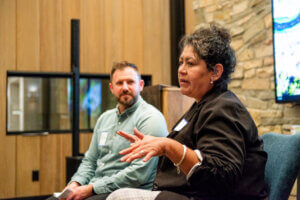
One such friendship he formed is with Pastor Norma Quintero of El Templo Cristiano, which is located in a ZIP code with one of Texas’ highest poverty rates. After months exploring the city, eating meals together, and processing how they each reconcile their own lived experience with the realities of the city, Brit and Norma forged a special bond.
“I am grateful [for these] efforts in bringing together people from different points across our city to make a greater impact and bring needed change,” Norma shared. “A friend is a friend at all times: in the good, the bad, and the ugly. A friend still chooses to stay by your side. I am honored to call Pastor Brit my friend.”
In a culture where churches are used to short-term mission trips to communities far from their own, these two pastors are committing to something longer and more local.
Norma joined the staff of Grace Northridge in a book study. Grace Northridge has helped support some needed building updates with El Templo. Norma taught Brit how to make one of her favorite Lenten dishes, and small groups from Grace Northridge and El Templo Cristiano began a series of dinners together for the purpose of building bridges and cultivating friendships.
“…small groups from Grace Northridge and El Templo Cristiano began a series of dinners together for the purpose of building bridges and cultivating friendships.”
“My hope for Grace Northridge is that by building a relationship with Norma and her church, we become more committed to this city,” said founding church member Tom Kingman. “I hope this isn’t just a one-year vision but something we can commit to for the next 15 years.”
Tom described a vision of mutual support and of people being aware of what’s happening with neighbors across the city and coming alongside each other to fill gaps and care for one another. “The idea of mutual learning is exciting,” said Robert Balfour, associate pastor at Grace Northridge. “The things that divide us as a community need to become less and less important. I look forward to the things that bind us across differences bringing us together.”
It is far too easy to live more divided than unified, and Brit invites us to picture a city that is more connected.
“When I imagine heaven,” he said, “I imagine there’s no more ‘them’—it’s ‘we.’ So, San Antonio looking more like heaven is people connecting deeply with each other. If we keep this up, I believe the city could look wildly different in ten years.”
“When I imagine heaven, I imagine there’s no more them—it’s we.”
| Pastora Norma’s Capirotada INGREDIENTS
INSTRUCTIONS
|
|---|
A conversation in the Great Hall stuck with Mark Roberts for over a decade, and now it is one of the guiding principles of his work at Fuller Seminary's Max DePree Center.
First impressions matter, and the staff of LLYC work hard on opening day to set the right tone for parents and especially campers.